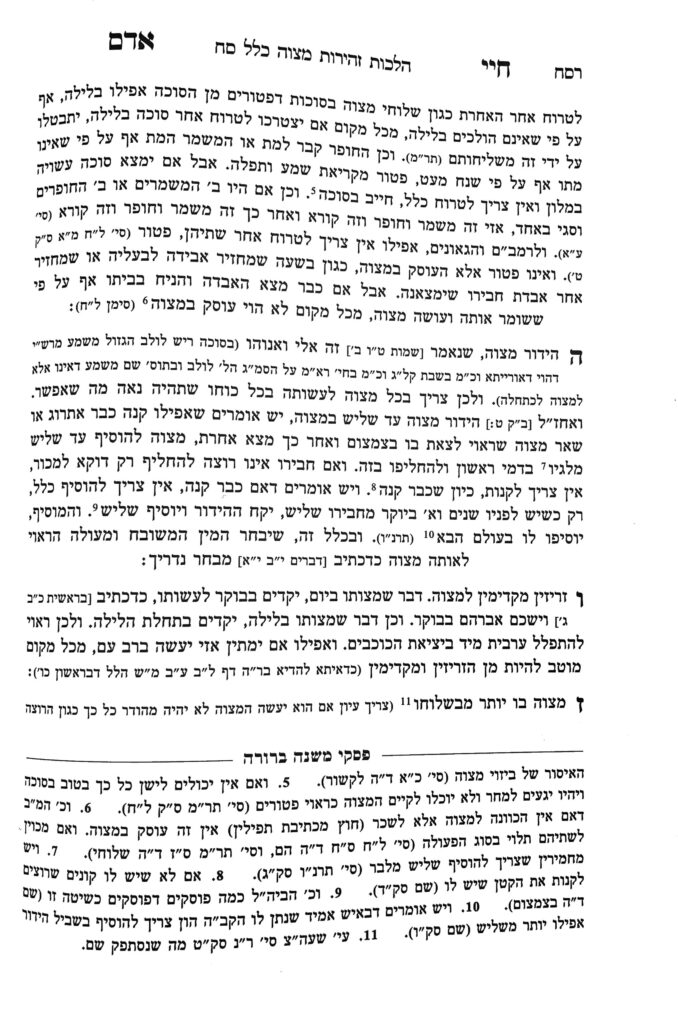We are continuing in siman 4, discussing the concept of oseik bmitzvah patur min hamitzvah.
In siman 71, the Biur Halacha writes that oseik bmitzvah applies only when both mitzvos are mitzvos asei. However, oseik bmitzvah does not exempt someone from a mitzvas lo saasei. Thus, in the case we discussed yesterday of an ani collecting tzedakah for himself during davening, there is an issur midivrei kabbalah (from the neviim) of al tashev dach nichlam, not to refuse someone asking. Therefore, the mitzvah of tefillah in which one is already involved would not exempt someone from giving tzedakah. (This issur only applies when the ani himself is collecting. If someone is collecting on behalf of the ani, it would not apply.)
The next question is if a person is oseik in a mitzvah derabanan, will it still exempt them from another mitzvah even if the other mitzvah is a mitzvah deoraysa. We have learned that a person oseik in a mitzvah kal is exempt from a mitzvah chamur (see shiur 1392), so does the same concept apply between a mitzvah derabanan and mitzvah deoraysa. The Biur Halacha writes that while the Pri Megadim says that this is certainly the halacha, he is unsure of the source for it.
The Sefer Nasiach Bechukecha quotes Rav Elyashiv in his sefer Ha’aros, who writes a source from Rashi in maseches Sukkah. Rashi writes that one is patur from a mitzvah deoraysa when they are already engaged in a mitzvah derabanan. He explains that the logic behind this exemption is that when a person is involved in a mitzvah, they are fulfilling ratzon Hashem. Since the Torah obligates us to listen to Chazal, when performing a mitzvah derabanan one is fulfilling ratzon Hashem as well, so there is no reason to switch to another mitzvah, even if the other mitzvah is deoraysa.
If a person has a safeik whether they fulfilled a mitzvah, so they are repeating the mitzvah out of safeik, and another mitzvah comes their way which they know they are certainly obligated in, the Sefer Nasiach Bechukecha quotes the Shaagas Aryeh who writes that one is not patur from the second, certain, mitzvah, and should switch to it.
However, the case of the Shaagas Aryeh was when it was efshar lekayeim shneyhem. When it is not efshar lekayeim shneyhem, we would go back to the previous thought process, that the ratzon Hashem is to fulfill a mitzvah out of safeik, fulfilling that mitzvah of Hashem would exempt a person from another mitzvah. Thus, if a person is fulfilling a mitzvah out of safeik, and another mitzvah comes their way, we would apply oseik bmitzvah patur min hamitzvah.
Summary
- Oseik bmitzvah patur min hamitzvah applies only when both mitzvos are mitzvos asei. If mitzvah B is a mitzvas lo saasei, one should stop mitzvah A and perform mitzvah B, the mitzvas lo saasei.
- Oseik bmitzvah patur min hamitzvah applies to mitzvos derabanan as well.
- Oseik bmitzvah patur min hamitzvah applies to a mitzvah being fulfilled out of safeik as well.



